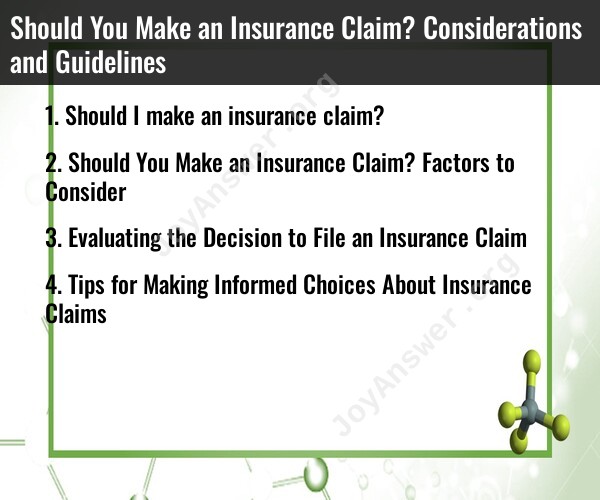Should I make an insurance claim?
Deciding whether to make an insurance claim can be a complex decision, and several factors should be considered before you proceed. Here are some important considerations and guidelines to help you decide whether or not to make an insurance claim:
1. The Nature and Extent of the Damage or Loss:
- Consider the severity of the damage or loss. If it's a minor issue, such as a small dent in your car or a small home repair, it may be more cost-effective to pay for it out of pocket, especially if the cost is below your insurance deductible.
2. Your Deductible:
- Review your insurance policy to understand your deductible, which is the amount you must pay out of pocket before your insurance coverage kicks in. If the cost of the claim is close to or less than your deductible, it might not be worthwhile to file a claim.
3. Future Premiums:
- Consider the impact of the claim on your future insurance premiums. Some claims can lead to increased premiums, making it important to weigh the long-term costs against the short-term benefits.
4. Multiple Claims:
- If you've recently made other claims or have a history of claims, it could result in higher premiums or even policy cancellation. Be cautious about making frequent claims.
5. Legal Requirements:
- In some cases, such as car accidents, there may be legal requirements to report the incident to your insurance company. Failure to do so could result in legal consequences.
6. Evaluate Your Coverage:
- Review your insurance policy to ensure the damage or loss is covered. Not all losses are covered, and you don't want to file a claim for something that isn't within the scope of your policy.
7. Loss of Claims-Free Discounts:
- Some insurance policies offer discounts for remaining claims-free for a specified period. Filing a claim may result in the loss of these discounts.
8. Consider the Cost-Benefit Analysis:
- Weigh the cost of the claim (including the deductible and potential premium increases) against the benefit you'll receive from the insurance payout. Determine if the claim is financially advantageous in the long run.
9. Insurance for Catastrophic Events:
- Insurance is typically intended to cover major, unexpected events. Consider reserving your insurance claims for significant losses rather than minor everyday expenses.
10. Consult with Your Insurance Agent:
- When in doubt, it's advisable to consult with your insurance agent or representative. They can provide guidance and help you understand the potential consequences of making a claim.
11. Emergency Situations:
- In emergency situations, such as health emergencies, it's essential to prioritize your well-being and that of your family. In these cases, filing a claim may be the right course of action.
Ultimately, the decision to make an insurance claim should be based on your individual circumstances, the terms of your policy, and your financial considerations. It's important to make an informed decision, considering both short-term and long-term implications. If you're uncertain, seeking advice from your insurance provider or a professional can be helpful in making the right choice.
Should You Make an Insurance Claim? Factors to Consider
There are many factors to consider when deciding whether to make an insurance claim. Here are a few of the most important:
- The cost of the damage. If the cost of the damage is less than your deductible, it may not be worth filing a claim. This is because you will have to pay your deductible out of pocket before your insurance company will start paying.
- The type of damage. Some types of damage, such as flood or earthquake damage, may be excluded from your coverage. Be sure to check your policy carefully to see what is and is not covered.
- Your claims history. If you have filed a lot of claims in the past, your insurance company may raise your rates or even cancel your policy.
- The impact on your future insurance rates. Even if you are not at fault for the accident, filing a claim can still raise your future insurance rates. This is because insurance companies see people who file claims as being more likely to file future claims.
Evaluating the Decision to File an Insurance Claim
Here are some questions to ask yourself when evaluating the decision to file an insurance claim:
- Can I afford to pay for the damage out of pocket?
- Is the type of damage covered by my insurance policy?
- How will filing a claim impact my future insurance rates?
- Do I have any other options for paying for the damage?
If you are unsure whether or not to file a claim, it is always best to err on the side of caution and file a claim. You can always drop the claim later if you decide that it is not worth it.
Tips for Making Informed Choices About Insurance Claims
Here are some tips for making informed choices about insurance claims:
- Understand your policy. Be sure to read your policy carefully so that you understand what is and is not covered.
- Get estimates from repair shops. This will help you to get a better idea of the cost of the damage.
- Contact your insurance company as soon as possible. The sooner you file a claim, the sooner the process can begin.
- Be honest and accurate in your reporting. Insurance companies have the right to deny claims if they find that you have been dishonest or inaccurate in your reporting.
- Keep copies of all documentation that you submit to your insurance company. This will help you to protect your rights if there is a dispute.
- Be patient. It can take several weeks or even months for an insurance claim to be processed and settled.
Filing an insurance claim can be a complex and stressful process. However, by following the tips above and knowing your rights, you can increase your chances of a successful outcome.
If you have any additional questions, please do not hesitate to ask.













